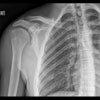Nearly half of Medicare patients in the U.S. interrupt or don't complete their prescribed radiation therapy treatments for head and neck cancer, according to a new study published in the September issue of the Archives of Otolaryngology -- Head and Neck Surgery.
The findings have ominous implications for patients who fail to comply with treatment schedules or drop out before completion, as these individuals may see their therapy fail or their cancer recur. But in a separate study, Italian researchers found that patients who were given nutritional supplements during radiation therapy were better able to tolerate treatment-related toxicities and, thus, had a higher therapy completion rate.
In the U.S. study, researchers at the Fred Hutchinson Cancer Research Center of the University of Washington and the Swedish Cancer Institute of Swedish Medical Center, both located in Seattle, used the Surveillance, Epidemiology, and End Results (SEER) database to identify and analyze trends of radiation treatment for 5,086 Medicare patients diagnosed with head and neck cancers between January 1, 1997, and December 31, 2003 (Arch Otolaryngol Head Neck Surg, September 2009, Vol. 135:9, pp. 860-867).
Selection criteria included patients for whom the head and neck cancer diagnosis was the first primary cancer recorded in the SEER directory, and who had at least 12 months of previous Medicare claims. Individuals diagnosed at an advanced stage were excluded. Patients were categorized by types of cancer, and claims for surgery, chemotherapy, and radiation therapy were analyzed.
The researchers defined a complete course of radiotherapy as at least 25 treatments for patients who had surgery before completing radiotherapy and at least 30 treatments for patients who did not have any surgical procedures. This definition is slightly lower than the generally accepted normal course of therapy because treatment lengths can vary based on the practice patterns of different cancer centers.
Treatment interruptions were defined as more than four but less than 31 days between treatments. Patients who stopped treatment for more than 31 days and resumed it again were excluded from the study.
The researchers found that in their overall study population, 40% of patients were unable to complete treatments or experienced interruptions in therapy. They also found differences in completion rates based on how their therapy was managed, such as whether they received surgery.
Patients who underwent surgery before radiotherapy were more likely to complete their treatment than patients who did not have surgery, with a completion rate of 70.4% and 52.0%, respectively. A total of 44.6% of the patients underwent surgery before completing radiotherapy (50.3% women, 41.8% men). On average, surgical patients started their radiation therapy treatment 74.4 days after diagnosis, compared with 52.8 days for nonsurgical patients.
A total of 751 patients, or 14.8%, had chemotherapy in addition to radiation therapy. Of these patients, 10.5% completed chemotherapy treatment prior to commencing radiotherapy, 84.6% had it concurrently, and 4.9% had it after the final radiotherapy treatment.
Study lead author Megan Dann Fesinmeyer, Ph.D., a postdoctoral research fellow of Fred Hutchinson Cancer Research Center's Etzioni Lab, and colleagues suggested that the reason surgical patients are more likely to complete radiotherapy treatments is because they may be healthier than patients who are not recommended for surgery, and they may also be more motivated to complete a full course of uninterrupted radiation therapy in spite of the toxic side effects they experience.
The authors attributed treatment interruptions and failure to complete treatment by patients with oral, pharyngeal, and laryngeal tumors to the toxic side effects of chemotherapy. In light of their findings, the authors recommended that further research should be undertaken to identify specific agents, doses, and schedules for chemotherapy that may be linked to interruption or noncompletion of radiation treatment.
Because the medical records of the patient cohort studied for the Medicare analysis were not available, it was not possible to analyze variables such as health at baseline, weekly radiation dose, or level of side effects experienced.
The Italian study
Meanwhile, a study by Italian researchers addresses a common problem in radiation therapy that can interrupt treatments: malnutrition. Patients with head and neck cancers are at high risk of malnutrition, as their ability to swallow and chew food can be significantly affected by the anatomic site of the tumor. Severe mucositis, a toxicity developed from chemotherapy and radiation therapy treatment, can prevent oral feeding, requiring a break in radiation treatment.
The researchers performed an early nutritional intervention on radiation therapy patients and found that the intervention gave patients a higher tolerance of treatment toxicities, according to the results of a small study published online in Supportive Care in Cancer (August 30, 2009). Because of this, more than twice as many patients may be able to complete radiation therapy treatment without interruption, compared to those who receive nutritional intervention late in their treatment cycle or not at all.
Since 2005, patients undergoing treatment at the Regional Centre for Head and Neck Cancer at Treviso Hospital of the University of Padua in Treviso receive intensive nutritional monitoring and support. This commences with a baseline nutritional assessment before radiotherapy treatments begin, followed by regular monitoring during and after completion of treatment.
Dr. Agostino Paccagnella and colleagues in Treviso Hospital's Nutrition, Metabolism, and Diabetes Unit conducted a retrospective study of 66 patients to determine the impact of early, intensive nutritional intervention on the nutritional status and clinical outcomes of patients receiving chemotherapy and radiotherapy treatment. The patient cohort consisted of 33 patients who received treatment with nutritional intervention between 2005 and 2007, and a control group of 33 patients treated in 2004 before the program was implemented.
All of the patients received one cycle of neoadjuvant chemotherapy, followed by two cycles of chemotherapy concurrently with radiotherapy. They received a dose of 66-70 Gy in 33 to 35 fractions over a period of seven weeks. Patients with neck metastases received a boost of 14 Gy; those without received 4 Gy.
The authors recorded the number of delays in radiation treatment and the number of unplanned hospitalizations for acute radiation therapy-induced mucositis. They recorded nutrition-influenced toxicities, nutritional status, and weight changes. Patients in the intervention group received energy-dense liquid oral supplements or enteral feedings as needed throughout and following treatment.
The researchers discovered that the percentage of patients who had to halt radiation treatment for more than five days was 63.6% in the control group, compared with 30.3% for the patients who received intensive nutritional intervention. The length of treatment delays was shorter for the nutritional group, an average of 4.4 days, compared with 7.6 days for the control group. And the percentage of patients who required hospitalization was also significantly less (16.1%) for the nutrition group compared to the other group (41.4%).
For each group, 31 patients completed their treatments.
The authors noted the limitations in size of their study group. However, the study demonstrates that intensive nutritional intervention affects the ability of patients to complete their prescribed treatments for head and neck cancer without interruptions, they concluded.
By Cynthia E. Keen
AuntMinnie.com staff writer
September 24, 2009
Related Reading
Radiation therapy slows return of head/neck cancer, September 15, 2009
Nutritional support improves dietary intake in radiation oncology patients, March 23, 2007
Copyright © 2009 AuntMinnie.com

















